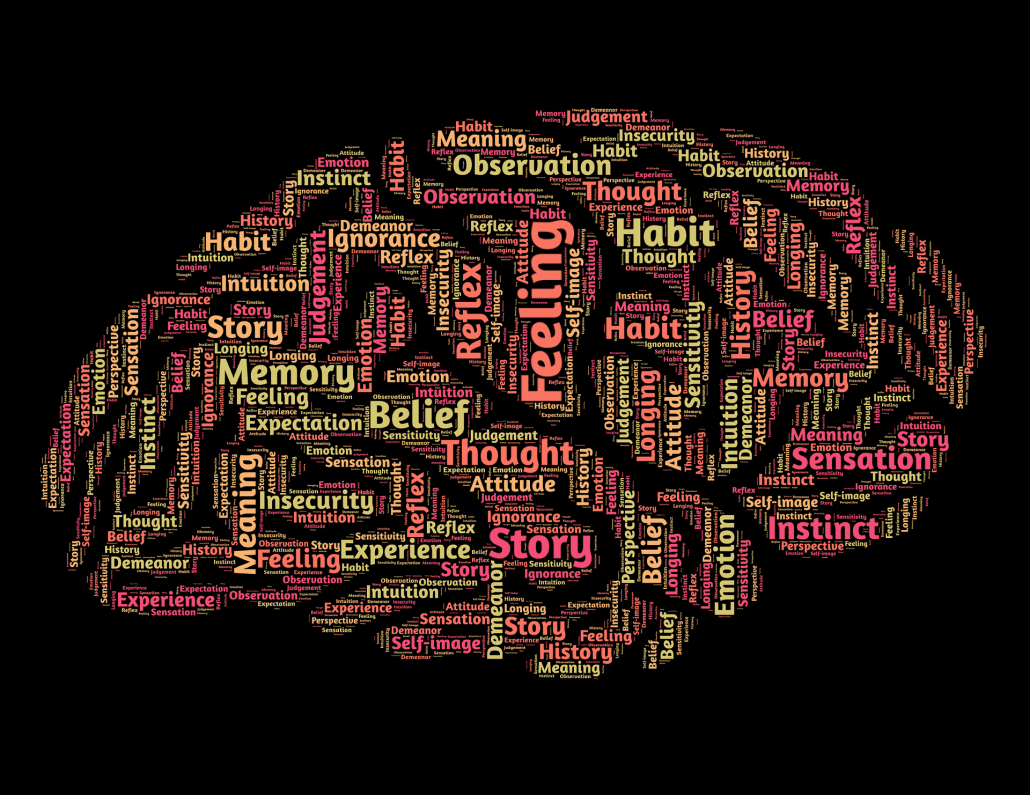
Top 10 Reasons to Read Proverbs and Teach It to Your Kids
The wisdom offered in the book of Proverbs is worth more than gold or silver. Find out how Proverbs can help your kids avoid serious mistakes and live a faithful life in God’s world.

Most Christians know they need to apply God’s truth to their lives. But often we forget to apply it to all of who we are and not just a part. The “Head, Heart, Hands” method of application helps us think holistically about how God wants to form all of who we are into the image of Jesus Christ.
“You can talk the talk but can you walk the walk?”
That phrase is used to rightfully challenge people whose talk vastly outpaces their actions. Talk is cheap. Doing is hard. Everyone hates hypocrisy.
God’s Word is always intended to produce change in the lives of Christians. Consider the following:
“But be doers of the word, and not hearers only, deceiving yourselves. For if anyone is a hearer of the word and not a doer, he is like a man who looks intently at his natural face in a mirror. For he looks at himself and goes away and at once forgets what he was like. But the one who looks into the perfect law, the law of liberty, and perseveres, being no hearer who forgets but a doer who acts, he will be blessed in his doing.”
– James 1:22–25
Do you want God’s blessing in your life? James stresses that God’s Word is meant to be put into action. Only hearing God’s Word, without doing, leads to self-deception and misses out on God’s blessing.
Self-deception is a dangerous thing. It leads you to thinking you are something you are not.
How does hearing (or reading) God’s Word without doing lead to self-deception?
It can lead to a head full of facts but a heart full of sin and a life full of rebellion against God. That head full of facts often leads to a person who can talk big but does little. It can also lead to others viewing you as a hypocrite. That’s discouraging.
It can also lead to us judging the maturity of our relationship with God based on head knowledge alone. The problem is that God wants to change all of who we are – not merely the facts running through our heads.

We need to apply God’s truth to all of our life because doing so corresponds to the work God is doing in us. God’s Spirit is currently reforming all of who you are into the likeness of Christ, and He wants you to cooperate with Him. His Holy Spirit works with His word to change you into the likeness of Christ.
“he saved us, not because of works done by us in righteousness, but according to his own mercy, by the washing of regeneration and renewal of the Holy Spirit”
– Titus 3:5
The Holy Spirit makes people spiritually alive and also begins a work of renewal that takes place over the entire life of the Christian:
“And we all, with unveiled face, beholding the glory of the Lord, are being transformed into the same image from one degree of glory to another. For this comes from the Lord who is the Spirit.”
– 2 Corinthians 3:18
This change is total and involves far more than head knowledge. This change of our entire self is seen a few places in the New Testament.
“Do not lie to one another, seeing that you have put off the old self with its practices and have put on the new self, which is being renewed in knowledge after the image of its creator.”
– Colossians 3:9–10
After Paul tells his readers to get rid of several different vices, he tells them the reason they are to do so is that their entire self is being renewed in the image of God.
This is the image of God that became corrupted after Adam and Eve sinned. This corruption affected the entire self – our thoughts, our desires, and our actions – and thus the entire self needs renewing from the power of sin.
In another place, Paul talks about the inward parts of us (e.g. thoughts, desires) as being renewed:
“So we do not lose heart. Though our outer self is wasting away, our inner self is being renewed day by day.”
– 2 Corinthians 4:16
To be clear, in this life, our bodies keep dying more every day. But our inner self, such as our thoughts, our desires, our spirits (those things that influence our actions) are being changed. One day Christians will also receive a new body which will complete the renewal. But until then, God’s primary renewing work in us is in our non-material parts.

While God is at work renewing our inner self, He wants us to respond to Him in love with our entire self. This is extremely important and the basis of what this entire article is about. Let’s look closely at these words of Jesus:
“And one of the scribes came up and heard them disputing with one another, and seeing that he answered them well, asked him, “Which commandment is the most important of all?” Jesus answered, “The most important is, ‘Hear, O Israel: The Lord our God, the Lord is one. And you shall love the Lord your God with all your heart and with all your soul and with all your mind and with all your strength.’”
– Mark 12:28–30
One of the Jewish religious leaders, a man who was well versed in Jewish Old Testament law, asks Jesus a question about the most important of all of God’s commands. Jesus cites Deuteronomy 6:5 as the answer. The command to love God is the most important thing a person is to do.
But notice that Jesus doesn’t just say “love God.” He gives several important additional descriptions of how we are to love God: with all our heart, with all our soul, with all our mind, and with all our strength.
Jesus says we are to love God with all our possible capabilities and faculties. Let’s look at each of these with the help of scholars who have done a lot of work understanding these words to get a better idea of what these capabilities and faculties are.

In the Bible, the “heart” (kardia in Greek) doesn’t typically refer to the organ that pumps blood. It refers to something much deeper and more central to who you are.
“the areas of the inner self, including: the volition, the mind, the desires”
– James Swanson, Dictionary of Biblical Languages with Semantic Domains: Greek (New Testament) 1
“Volition” is our decision making capabilities like our wills. Notice that in this definition, the heart also includes the mind as well as what we desire.
“As a rule, the term denotes the center of intellectual and spiritual life, the inner life in opp. to external appearance (2 Cor 5:12; 1 Thess 2:17; cf. 1 Sam 16:7). The powers of the spirit, reason, and will, as well as the movements of the soul—the feelings, the passions, the instincts—have their seat in the heart. One may say that the heart stands for the individual ego: it is simply the person.”
– Moisés Silva, ed., New International Dictionary of New Testament Theology and Exegesis 2
In Silva’s definition, the heart includes just about all the important areas of who we are.
“[heart] refers thus to the inner person, the seat of understanding, knowledge, and will, and takes on as well the meaning conscience.”
– Horst Robert Balz and Gerhard Schneider, Exegetical Dictionary of the New 3
You can see from all these definitions that the heart is an extremely important part of who we are. The heart is the control center of the person. It is the core of who you are.
The Greek word for soul (psyche in Greek), can mean a few different things including life itself or the immaterial part of a person in contrast to the material, but here it probably means the following:
“inner self, heart, mind; a psychological faculty”
– James Swanson, Dictionary of Biblical Languages with Semantic Domains: Greek (New Testament) 4
Sound familiar? The soul is very similar to the heart.
“[soul] denotes the inner life of a person and its various faculties.”
– Moisés Silva, ed., New International Dictionary of New Testament Theology and Exegesis 5
There is definitely overlap here with the term “heart” above. But once again, Jesus is referring to an immaterial part of our being that is at the core of who we are, the things we think, what we love, and the decisions we make.

This is perhaps the easiest of the terms to understand. In the Bible, the term mind typically means what you might guess it means:
“mind, reasoning, understanding, thinking”
– James Swanson, Dictionary of Biblical Languages with Semantic Domains: Greek 6
The New International Dictionary of New Testament Theology and Exegesis (NIDNTTE) identifies this Greek word with “understanding, intelligence, mind, thought” with the author of the article commenting that “the mind is a religious faculty of judgment” (Moisés Silva, ed., New International Dictionary of New Testament Theology and Exegesis). 7
What Jesus is referring to here is the intellectual aspects of the human person. God is to be loved with all that goes on in our rational intellect which obviously includes the very thoughts we choose to think.
Have you ever realized that God cares about the thoughts going through our heads? We have more control over those than we think we do. We are to get those things under control and direct them toward the love of God.

Strength is another term that is fairly easier to understand. The Dictionary of Biblical Languages says the word simply means “strength, might, power.”8 NIDNTTE says the term refers to bodily strength and also strength of character or human capability.9
Jesus is saying we must love God with all the capability we have. This includes all our actions.
When we look at all these terms together, Jesus is simply saying we must love God with all our internal faculties and with all our capabilities. Everything we are is to be aligned and directed toward the love of God.

If God is renewing our inner being, and if Jesus calls for our entire being to love God, it makes perfect sense that as we think about applying God’s truth we should be thinking about applying it to all of who we are, not just a part of who we are.
Out of this conviction comes what has been called the “Head, Heart, Hands” model of application (I have no idea who first coined these terms but it certainly wasn’t me). “Head, Heart, Hands” is just an easy way to remember to apply God’s truth to all that we are and all that we control about ourselves.
Here is what each term represents and how it corresponds to the words Jesus used in referring to how we are to love God:
As you can see, the terms “Head, Heart, Hands” correspond fairly well to the categories Jesus used. It helps that they all start with “H” and cover all the aspects of who we are.
Please note that there can be overlap between these terms and what they represent. For instance, should we put our choices in the “Heart” category or the “Hands” category? I don’t think it matters really. All this tool does is to help you think about yourself holistically; not get caught up on how to classify things.

It is important that we apply God’s truth holistically. Why? Well Let’s look at the problems that occur if we don’t.
What might happen if we only applied God’s truth to our intellectual faculties but not to our hearts or our hands? I think we might have a situation such as Paul was addressing in his letter to the Corinthians:
“Now concerning food offered to idols: we know that “all of us possess knowledge.” This “knowledge” puffs up, but love builds up. If anyone imagines that he knows something, he does not yet know as he ought to know. But if anyone loves God, he is known by God.”
– 1 Corinthians 8:1–3
Notice how Paul is contrasting a certain type of knowledge with love. Somehow, the Corinthians claimed to have knowledge about the topic at hand but it wasn’t properly united to love for God. The result was arrogance (being “puffed up”).
When we know things about God, but we don’t let those facts or understandings change our hearts or our actions, self-deception occurs. We think we know something but that knowledge hasn’t completed its intended work. It hasn’t changed us in the way it should.
Remember, God is working to renew our entire beings, not just our minds. Yes, the mind is absolutely essential to the process of becoming more like Jesus (Romans 12:2), but it can’t stop there. The knowledge we gain must affect the rest of who we are in order to cooperate with God’s work to transform the totality of us into His image.
Think about it. We probably all know the religious “know it all” – the person who can give you an answer to just about everything but is seriously lacking in actually applying it to their lives. Is that person really mature in Christ? Does great knowledge make you anything special? There are plenty of PhDs in the world who know a lot about God but don’t love Him at all. It is very sad and very tragic. And there are unfortunately lots of people in churches who know much but love and do little.
What would happen if we were all about feelings and desires and passion for God but we didn’t have the knowledge or actions to accompany those passions?
Well, it wouldn’t amount to much. People can talk about their feelings all day long but if those feelings aren’t shaped by God’s truth and united into the kind of actions that are pleasing to God, they are basically worthless.
People who say they love God but don’t do what He says really don’t love Him. After all, consider what Jesus says here:
“If you love me, you will keep my commandments.”
– John 14:15
Love has to show itself in action or it isn’t really love. It’s why John also made this statement to his readers:
“By this we know love, that he laid down his life for us, and we ought to lay down our lives for the brothers. But if anyone has the world’s goods and sees his brother in need, yet closes his heart against him, how does God’s love abide in him? Little children, let us not love in word or talk but in deed and in truth.”
– 1 John 3:16–18
Real love models Jesus. Jesus’ love for His Father was shown through what He did. Jesus didn’t just have strong feelings for God. He loved God with His actions as well and we are to do the same.
What if someone is all about action but lacks both the heart and the knowledge? We have a perfect example of this kind of person in King Saul.
In 1 Samuel 10:8, Saul was given instructions by the prophet Samuel to wait for seven days for Samuel to arrive, after which he would be told what to do. But in 1 Samuel 13:8-10, we are told that Saul gets impatient and offers sacrifices. This was not something a king was supposed to do under God’s law. Right when Saul finishes the sacrifices, Samuel arrives and says that God has taken the kingdom away from Saul for his disobedience.
The point here is that even though Saul made a sacrifices, an action that in and of itself wasn’t bad, he wasn’t the person authorized to make the sacrifice. His action was not in accordance with the knowledge given in God’s law. Additionally, Saul showed time and time again his heart was not for the Lord but for himself. Actions that are not united with love for God and done in accordance with God’s instructions are dangerous indeed.
We can be the same way. Sometimes we neglect what God tells us to do and we do something else in its place thinking we are justified in doing so. But God doesn’t allow us to determine what is right or wrong with our actions. When we do that, we are replacing Him as the rightful authority in our lives and make our own judgment supreme instead. Unfortunately, that is sin.
Let’s look at a few more possible problems of not applying God’s word holistically.

What if someone knows the right thing to do, and has a desire to do it, but doesn’t choose to actually do it? You might remember a passage we already cited at the beginning of this article that speaks to this:
“But be doers of the word, and not hearers only, deceiving yourselves. For if anyone is a hearer of the word and not a doer, he is like a man who looks intently at his natural face in a mirror. For he looks at himself and goes away and at once forgets what he was like. But the one who looks into the perfect law, the law of liberty, and perseveres, being no hearer who forgets but a doer who acts, he will be blessed in his doing.”
– James 1:22–25
We need encouragement constantly to take that last step and actually do what we know we should do and what we want to do. The “Head, Heart, Hands” model reminds us that thinking and feeling are incomplete. We need action.
Imagine if you were going through a very difficult time in life. Imagine that someone you love told you they wanted to help you, and they thought about helping you, but they didn’t actually get around to doing it. How would that make you feel?
Now imagine another friend or loved one who actually follows through with their thoughts and love for you and came and cared for you in your time of need. Which person do you appreciate more?
Of course it is the person who had their head and their hearts united with actual action that was a true benefit to you. God wants the same from us. He wants action and not merely thoughts and feelings.
So what about people who know what God wants them to do and actually do it but don’t really do it out of love for God? The Bible actually offers many examples of this but we will just look at one.
Jesus was aware of the “Head and Hands but no Heart” problem and addresses it here:
“ ‘This people honors me with their lips, but their heart is far from me”
– Matthew 15:8
This was a big problem for Israelites both in New and Old Testament times. Often they would say the right things (which is a form of action) and even do some of the religious things God required (like making sacrifices) but didn’t do it out of a right heart.
This was a big offense to God. Actions that are done with the wrong motives aren’t pure.
You probably know what this feels like. Has anyone ever given you a gift and you knew they were doing it, not because they loved you, but because they were merely checking a box? Or maybe they wanted to appear like they cared for you but didn’t really?
You would be hurt by this wouldn’t you? See, we don’t just want people’s actions, we want people to actually care about us and do those actions from a heart of love and concern. God is the same way.
Here is the last category we will look at.
What if someone does religious things passionately but they aren’t the things God commands? Unfortunately, this is the epitome of false worship.
Remember the golden calf incident at Mt. Sinai in Exodus 32? Moses was taking too long talking to God up on the mountain and the people decided they wanted other gods. So they pressured Aaron into making a golden calf to worship.
See their hearts wanted a god. Their actions followed through with their desires and they made one and worshiped it. But this is exactly what God told them not to do – to have no other gods before Him. Their “Heart and Hands” without being governed by the “Head” knowledge God gave them ended with them making a catastrophic decision of disloyalty to God which was a massive sin.
God is the one who gets to tell us what to do. We can’t just make up our own religious actions and expect them to be pleasing to God. We need to be guided by what He tells us to do. Head knowledge is essential.
Hopefully you see that the “Head, Heart, Hands” model for applying God’s truth is thoroughly biblical, avoids many of the problems that come with neglecting one of these three aspects of ourselves, and coincides with God’s desire for us to love Him with all of who we are.
In other articles, I will take some Bible passages and demonstrate how we can actually put the Head, Heart, Hands model into practice.

Jim is Founder, Editor, and Author at 4Elect. He holds a Master of Arts in Theological Studies from Reformed Theological Seminary. Jim rejoices that God chooses insignificant people to bring glory to Himself.

The wisdom offered in the book of Proverbs is worth more than gold or silver. Find out how Proverbs can help your kids avoid serious mistakes and live a faithful life in God’s world.

The most important relationship in your life is your relationship with God. No other relationship comes close. Grow in knowing and loving Him.

If you are at a loss of what to pray for, here’s a solution – simply open your Bible for an endless source of ideas. Here’s how to do it.

Prayer can be hard work. Most Christians are probably not happy with their prayer life and know they need to improve. Here are some helps identifying problems and how to make prayer easier.
Unless otherwise indicated, Scripture quotations are from The ESV® Bible (The Holy Bible, English Standard Version®), copyright © 2001 by Crossway, a publishing ministry of Good News Publishers. Used by permission. All rights reserved.
Third-Party Content4Elect does not necessarily endorse every idea or comment in a video or article or quote created by a third party author, minister, etc.. Additionally, if we post one piece of material by an author or speaker, it certainly does not mean we endorse all content ever produced, or words spoken by, that particular individual. We post third party content that we believe is overall spiritually beneficial to our readers. We screen all third party content for suitability.